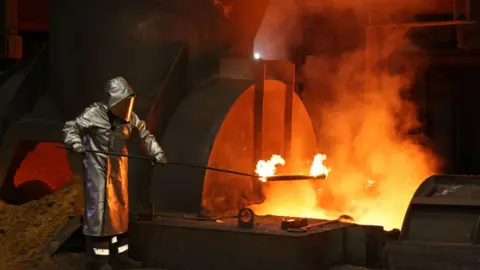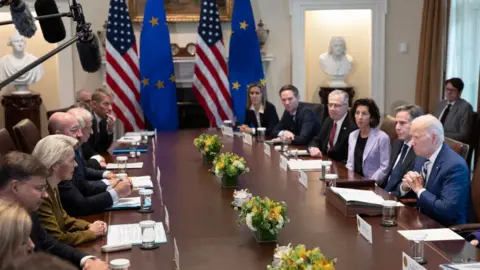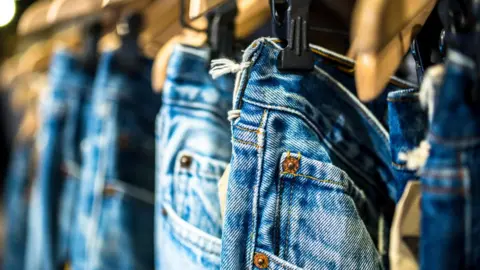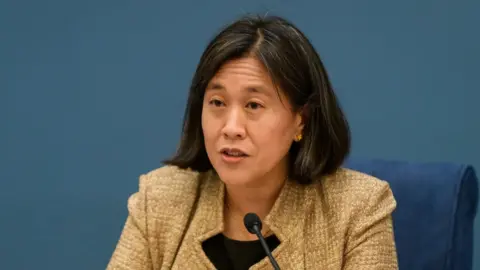Europe and US extend trade truce over Trump tariffs
 Getty Images
Getty ImagesThe European Union and the US have agreed to pause their trade war until after the presidential election.
US tariffs on steel and aluminium and the EU's retaliation on goods including motorcycles and whisky will be suspended until the end of March 2025.
They were originally imposed when Donald Trump was president on national security grounds.
But they were paused under Joe Biden's administration.
The deferment will allow President Biden to keep his EU allies onside.
But because they have been paused and not abolished, he will appear to be tough on trade for a domestic audience.
The US metal industry provides jobs in places such as Pennsylvania and Ohio - states which could be crucial to President Biden in the election in November 2024.
In the absence of a full solution to their differences "this has always been the obvious deal", according to Brad Setser, a trade expert at the Council on Foreign Relations think tank in Washington, who has also worked on trade policy for the Biden administration.
"Returning to open conflict isn't in the interest of the US or the EU", he said, especially now that Ukrainian and Russian production has largely been removed from global markets.
Mr Trump imposed 25% tariffs on steel and 10% on aluminium coming from the EU into the US in 2018. He cited national security grounds for the decision, using a law known as Section 232.
At the time, he said: "If you don't have steel, you don't have a country".
In retaliation, the EU put tariffs on US-made goods such as Harley Davidson motorcycles, jeans and bourbon whiskey.
President Biden has backed the tariffs but in 2021 said his administration would allow "limited volumes" of EU-produced metals into the US from 2022.
 Getty Images
Getty ImagesLast year, the EU suspended its measures until 31 December 2023, meanwhile the US replaced the Section 232 tariffs with a quota system, resulting in above-quota EU steel and aluminium still being subject to tariffs.
Last year, the World Trade Organisation (WTO) ruled that the tariffs were against global trade rules.
At the time the US government strongly rejected the ruling and said it had no intention of removing the measure. It said it was "committed to preserving US national security by ensuring the long-term viability of our steel and aluminium industries".
President Trump has already raised the idea of new 10% tariffs on all goods coming into the US if he wins next year's presidential election.
Bruce Kasman, chief economist at the US investment bank JP Morgan, told the BBC that the re-emergence of a trade war would be "significant", because of the potential impact on business confidence if not because of the tariffs themselves.
EU Trade Commissioner Valdis Dombrovskis has welcomed the latest suspension as providing stability and confidence to European companies.
"It provides us with the necessary space to continue pursuing the full and permanent removal of 232 tariffs on EU exports, as well as working on addressing global overcapacity and decarbonisation of steel and aluminium industries".
 Devaki Knowles
Devaki KnowlesThe agreement that has been extended allows 3.2 million metric tons of EU made steel to be imported under a tariff free quota each year.
However, last year the US actually bought 3.8 million tons, resulting in tariffs worth €293m (£252m)
In 2022, the US collected €42m of tariffs on EU aluminium, they were paid on 64,000 tons out of total imports of 289,000 metric tons.
The UK was among the countries to agree an exemption to the US tariffs on steel and aluminium.
Carbon emissions
The US and EU have been leading efforts to reach a global deal on steel and aluminium production which would address its impact on climate change as well as dumping, which is when countries sell metal they don't need to other countries at below cost price.
Both metals are responsible for significant amounts of carbon emissions, and the dirtiest production would face the highest tariffs if an agreement can be reached in talks which have already lasted more than two years.
The US Trade Representative Katherine Tai welcomed the suspension of tariffs with the EU, saying it allowed more time to complete complex negotiations.
"Our goal is to forge a forward-looking arrangement that will allow us to join forces economically to incentivize fair and clean production and trade in the steel and aluminium sectors", she said.
 DeFodi Images News
DeFodi Images NewsHowever, the lack of a global deal, as well as the failure to reach a permanent solution on bilateral tariffs reflect a wider malaise in international trade talks.
The Biden administration has repeatedly said it wants to see reform of global trade rules including the WTO and its system for resolving disputes. However, it has not published a lot of detail of what that those changes would be.
It means there are low expectations for a major meeting of the WTO which is scheduled for Abu Dhabi in February.
Last week the French trade minister Olivier Becht said "it's important to be prepared in case it's not possible to save the system".
